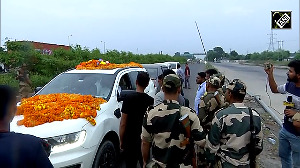Ahead of taking charge as the head of the American Key Central Command, General David H Petraeus on Wednesday said turning things around in Afghanistan and Pakistan will require taking away militant sanctuaries and strongholds, which he expected the insurgents would defend tenaciously.
'Certainly in Afghanistan, wresting control of certain areas from the Taliban will be very difficult,' Petraeus, who would be directly in charge of fighting in both the countries, said.
'I expect the fight against insurgents in Afghanistan and Pakistan to get worse before it gets better,' the American General, who as commander of forces in Iraq is credited with helping to reduce the violence there.
Pointing towards Pakistan, he said, the recent Marriott Hotel bombing had amplified the deadly threat posed by insurgents.
'In both places, in certain areas, the going may be tougher before it gets easier,' he said in an interview to New York Times in London.
Petraeus was in London and Paris this week as part of several weeks of information gathering before he takes up his job as commander of all American forces in the Middle East and Afghanistan on October 31.
He visited Afghanistan in August and spent a day with the Pakistani chief of Army staff, General Ashfaq Parvez Kayani, on a US aircraft carrier in the Arabian Sea.
For Afghanistan, the American Commander advocated increasing international forces as well as 'thickening' local forces through greater political engagement of tribes and reconciliation with insurgents who were not hard-core.
'There is a need to engage countries in the region, including Saudi Arabia, to help with the Taliban,' he said.
The general felt that the strategy in Afghanistan had been in the wrong direction. 'I think everyone is rightly concerned about them.'
'Counter-insurgents have to understand that in as nuanced a manner as possible, and then with that kind of understanding try to craft a comprehensive approach to the problems.'
He wanted some of the Iraq experience to be examined in the Afghan context. In particular the success of the Awakening Councils and persuading former insurgents to reconcile and work against Al Qaeda in Mesopotamia, could work in Afghanistan and was already under consideration there.
'Certainly many on the ground think that perhaps in certain areas local reconciliation initiatives hold some potential,' he said.
Talking about Pakistan, he praised and recognised the country's determination to handle the problem of extremism using its own forces, as well as its opposition to US military intervention. 'This,' he said, was to be 'applauded and helped'.
In particular, he welcomed the new government's recent public recognition that extremism was now the most severe threat facing the country, because the recognition meant it would be adopted through all government institutions.
'The heartening aspect is there appears to be a willingness on the part of the Pakistani government and military to undertake the kind of operations necessary,' he said.




